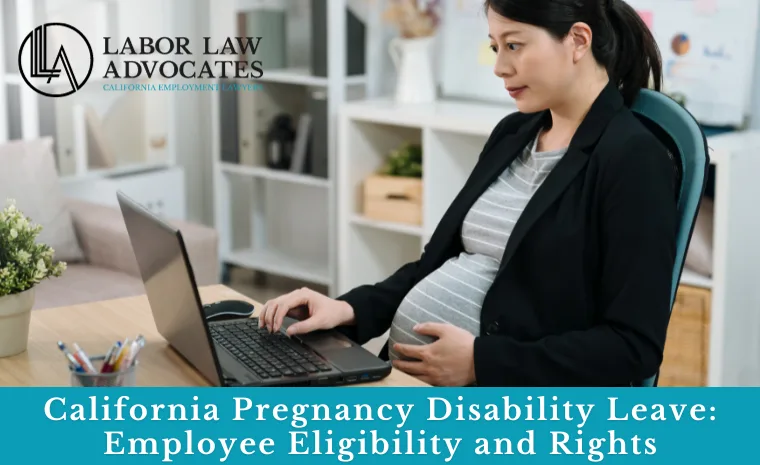California Pregnancy Disability Leave: Employee Eligibility and Rights
Navigating the complexities of pregnancy while maintaining one’s professional career can be a challenging journey. In California, there exists a robust legal framework designed to protect the rights and well-being of expecting mothers in the workplace. This framework is known as the California Pregnancy Disability Leave (PDL).
For expectant mothers and their families, understanding the nuances of California’s PDL is important. It represents not just a legal mandate but a commitment to the health and equity of pregnant employees.
In today’s blog, we will look into the essential aspects of California Pregnancy Disability Leave, employee eligibility, its main purposes, and the protective rights it affords. Our goal is to provide a comprehensive guide, not only to meet the legal requirements but to inform, so individuals can navigate this critical period in their lives with confidence and peace of mind. Our focus will be:
- Defining the California Pregnancy Disability Leave
- The main purpose of PDL
- The eligibility requirements behind PDL
- What to do if your PDL is denied by an employer
Facing discrimination in your workplace? You are not alone.
Defining the California Pregnancy Disability Leave
California’s Pregnancy Disability Leave or PDL is a legal provision that offers job-protected leaves of absence to pregnant employees in the state of California. It is part of the broader California Family Rights Act (CFRA) and the California Fair Employment and Housing Act (FEHA).
PDL specifically addresses the needs of pregnant women who are temporarily disabled due to pregnancy, childbirth, or related medical conditions. Its key points include:
Eligibility
To be eligible for PDL, an employee must work for an employer with five or more employees, must be disabled due to pregnancy, childbirth, or a related medical condition, and must have been employed for a period of time of at least 12 months.
Duration
PDL provides up to four months of job-protected leave for a pregnancy-related disability. If a pregnant employee is unable to perform her job due to pregnancy, she can take up to four months of leave without the risk of losing her job.
Intermittent Leave
PDL can be taken on an intermittent basis or in reduced schedule increments. An eligible employee can take the leave as needed based on her medical condition. For example, for doctor-ordered bed rest, the employee can ask the time to do so.
Notice and Certification
Employees are required to provide their employers with reasonable notice and medical certification from a health care provider to establish the need for PDL. Employers can ask for this certification to verify the employee’s eligibility.
Continuation of Benefits
During PDL, employers must maintain the employee’s group health coverage and other benefits. However, the employee is still responsible for their portion of the premiums, if any.
Retaliation Prohibited
Employers are prohibited from retaliating against employees for taking PDL. It is illegal to terminate, demote, or otherwise discriminate against an employee for exercising their rights under PDL.
Coordination with Other Leave Laws
PDL can run concurrently with other leave laws, such as the federal Family and Medical Leave Act (FMLA) or the California Family Rights Act (CFRA), but it is specifically focused on pregnancy-related disabilities.
Consult with your employer or the California Department of Fair Employment and Housing (DFEH) for specific details and requirements related to Pregnancy Disability Leave, as employment laws and regulations may change over time, and your individual circumstances may vary.

The Main Purpose of PDL
The purpose of pregnancy disability leave in California is to provide job-protected time off to pregnant employees who are facing short-term disabilities due to pregnancy, childbirth, or related conditions.
This leave is designed to serve several important objectives:
- Health and Well-being: PDL prioritizes the health and well-being of pregnant individuals. It acknowledges that pregnancy and childbirth can lead to medical conditions that may temporarily incapacitate a woman for the foreseeable future and require time off to recover and receive necessary pre and postnatal care.
- Support for Pregnancy-Related Disabilities: It ensures that pregnant employees have the opportunity to take the time they need to address and recover from pregnancy-related disabilities without fear of losing their jobs. This support is critical for both the physical and mental health of the pregnant person.
- Prevent Unlawful Employment Discrimination: PDL helps prevent discrimination based on pregnancy. It ensures that pregnant individuals are treated fairly in the workplace by providing them with the same job-protected rights and benefits as employees with other types of temporary disabilities.
- Ensuring Maternal and Infant Health: Maternal and infant health can be positively influenced by allowing pregnant employees to take personal time off when needed. PDL encourages prenatal care, rest, and postpartum recovery, all of which contribute to healthier pregnancies and childbirth experiences without undue hardships.
- Workplace Equality: By offering PDL, it promotes workplace gender equality. It recognizes that the ability to take time off during pregnancy and after childbirth is essential for women’s participation in the workforce and reduces the risk of discrimination and career setbacks.
- Legal Protection: PDL provides a legal framework to protect the rights of pregnant employees. It prohibits employers from retaliating against or discriminating against employees for taking this leave.
Overall, PDL aims to ensure that pregnant individuals have the necessary time and support to manage their pregnancy-related health conditions without jeopardizing their employment for a period of time. It contributes to a more inclusive and equitable workplace and supports the health and well-being of both the employee and their child.
The Eligibility Requirements Behind PDL
To be eligible for the benefits of California Pregnancy Disability Leave, pregnant workers must meet several criteria or a specific employee status:
Employer Size
Your employer must have five or more employees to be subject to California’s PDL law. If your employer has fewer than five employees, they may not be required to provide PDL.
Employee Status
You must be an eligible full-time employee, which generally means you have been working for your employer for at least 12 months. During this time, you must have accumulated 1,250 minimum hours of service, similar to the federal Family and Medical Leave Act (FMLA) requirements, so part-time employees are not generally covered by this leave.
Pregnancy-Related Disability
You must be experiencing a pregnancy-related disability. This includes conditions like severe morning sickness, pregnancy-related complications, gestational diabetes, recovery from childbirth, or other medical conditions related to pregnancy.
Medical Certification
Eligible workers may need to provide medical certification from a healthcare provider to confirm your pregnancy-related disability and the need for leave. This helps health insurance verify your eligibility for PDL.
Notice
You should provide your employer with reasonable notice of your intention to take PDL. While the law does not specify a specific advance notice period, it’s a good practice to inform your employer as soon as possible when you know you need PDL.
No Concurrent Leave
It’s important to note that PDL is specifically for pregnancy-related disabilities and is separate from other types of leave. If you’re also eligible for the California Family Rights Act (CFRA), PDL can run concurrently with these leaves, but the total duration of leave may not exceed the PDL’s maximum of four months.
Got denied the leaves and benefits you rightfully deserve?
What to do if the PDL is denied by your employer
If your employer denies you PDL, and you believe you are eligible for it, there are certain steps you can follow to rectify the situation. First and foremost, carefully review your eligibility to ensure that you meet all the criteria for PDL as noted above. Additionally, make sure you have provided any required medical certifications and notice to your employer.
Next, initiate a conversation with your employer. Communicate your understanding of your eligibility and ask for clarification on the reasons behind the denial. This initial discussion may help resolve any misunderstandings or miscommunications that could be at the root of the issue.
However, you need to document all communication related to PDL, including emails, letters, and notes from in-person discussions. Maintaining a comprehensive record of these interactions can be invaluable should you need to prove a case later.
Nevertheless, if your employer continues to deny your PDL without valid reasons, it is advisable to consult with an experienced employment law attorney who specializes in California labor laws. They can provide you with legal advice, review your situation, and guide you on the best course of action.
In cases where resolution with your employer is not forthcoming, first consider filing a complaint with the California Department of Fair Employment and Housing. They handle cases related to workplace discrimination and violations of employment laws. You can visit their website or contact them to initiate the complaint process.
Furthermore, the DFEH may offer mediation services to resolve disputes between employees and employers, a less adversarial way to reach a resolution and ensure you receive your entitled benefits.
But if all else fails and your employer persistently denies your rights, you may have the option to pursue legal action. Your employment attorney will guide you through this process, which might include filing a lawsuit in court to assert your rights. For that reason, you must act promptly and seek legal counsel to protect your rights and address any unjust denials of PDL benefits.
Fight For Your Rights With Labor Law Advocates!
Safeguard your rights as an employee in California. By understanding your rights, recognizing violations, seeking internal resolution, consulting with an employment attorney, and filing a complaint or lawsuit, you can assert your rights and hold employers accountable for their actions. Remember, standing up for yourself not only benefits you but also helps create a fair and just work environment for all employees in the state.
Labor Law Advocates has California’s award-winning benefit and leaves violations attorneys who specialize in employment rights and labor laws. We can help you get proper compensation if you get denied the California Pregnancy Disability Leave for any unlawful reason. Consult with the most qualified employment attorney in California for legal advice today.
Speak with one of the experts at Labor Law Advocates for a free consultation. We are available 24/7. Call us anytime at (424)-688-3632.




